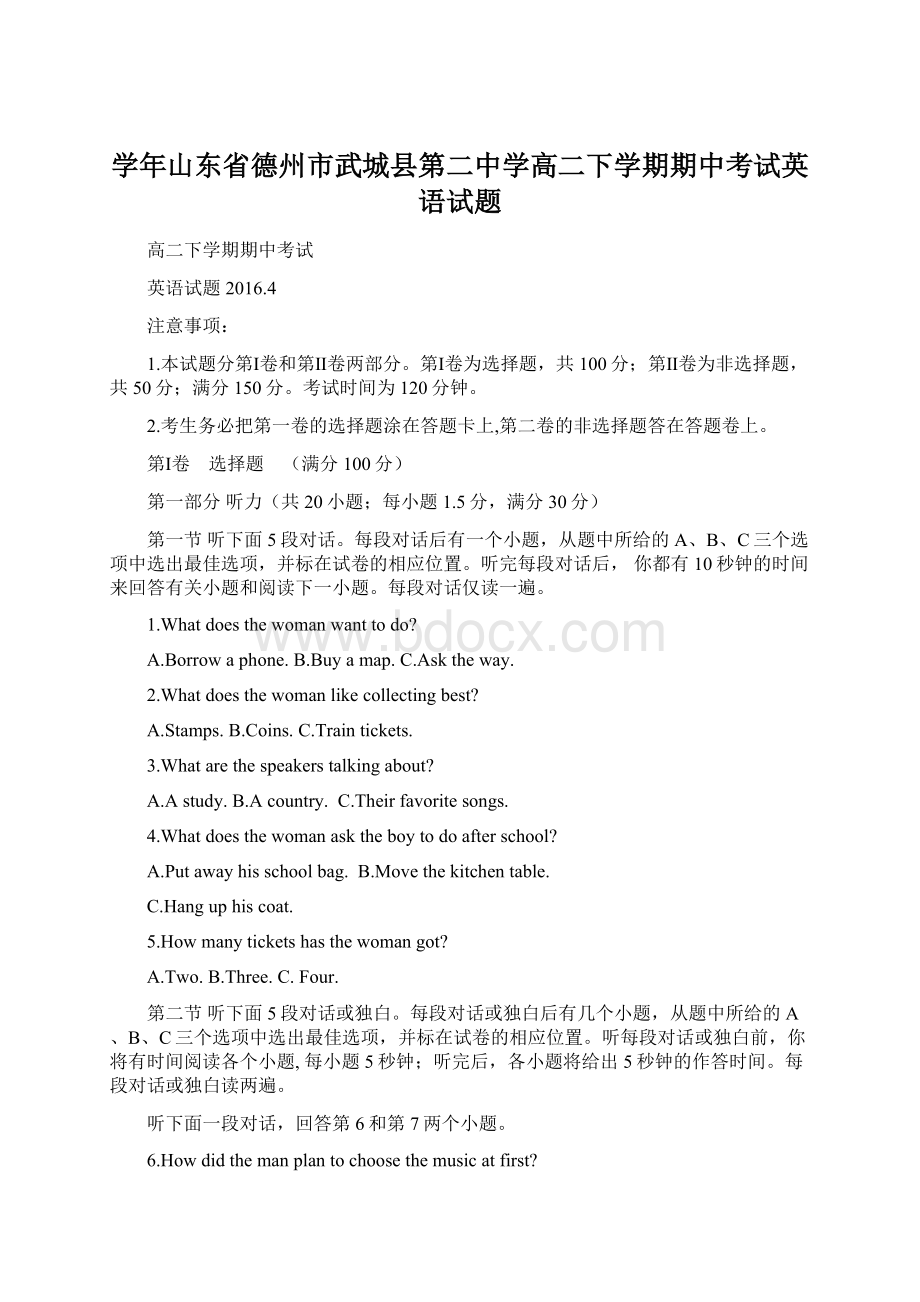学年山东省德州市武城县第二中学高二下学期期中考试英语试题.docx
《学年山东省德州市武城县第二中学高二下学期期中考试英语试题.docx》由会员分享,可在线阅读,更多相关《学年山东省德州市武城县第二中学高二下学期期中考试英语试题.docx(17页珍藏版)》请在冰豆网上搜索。

学年山东省德州市武城县第二中学高二下学期期中考试英语试题
高二下学期期中考试
英语试题2016.4
注意事项:
1.本试题分第Ⅰ卷和第Ⅱ卷两部分。
第Ⅰ卷为选择题,共100分;第Ⅱ卷为非选择题,共50分;满分150分。
考试时间为120分钟。
2.考生务必把第一卷的选择题涂在答题卡上,第二卷的非选择题答在答题卷上。
第Ⅰ卷 选择题 (满分100分)
第一部分听力(共20小题;每小题1.5分,满分30分)
第一节听下面5段对话。
每段对话后有一个小题,从题中所给的A、B、C三个选项中选出最佳选项,并标在试卷的相应位置。
听完每段对话后,你都有10秒钟的时间来回答有关小题和阅读下一小题。
每段对话仅读一遍。
1.Whatdoesthewomanwanttodo?
A.Borrowaphone.B.Buyamap.C.Asktheway.
2.Whatdoesthewomanlikecollectingbest?
A.Stamps.B.Coins.C.Traintickets.
3.Whatarethespeakerstalkingabout?
A.Astudy.B.Acountry.C.Theirfavoritesongs.
4.Whatdoesthewomanasktheboytodoafterschool?
A.Putawayhisschoolbag.B.Movethekitchentable.
C.Hanguphiscoat.
5.Howmanyticketshasthewomangot?
A.Two.B.Three.C.Four.
第二节听下面5段对话或独白。
每段对话或独白后有几个小题,从题中所给的A、B、C三个选项中选出最佳选项,并标在试卷的相应位置。
听每段对话或独白前,你将有时间阅读各个小题,每小题5秒钟;听完后,各小题将给出5秒钟的作答时间。
每段对话或独白读两遍。
听下面一段对话,回答第6和第7两个小题。
6.Howdidthemanplantochoosethemusicatfirst?
A.Letsomeonedecideonit.
B.Askpeoplefortheiradvice.
C.Alloweveryonetobringapiece.
7.Whatisthewomangoingtodo?
A.InviteSoniatotheparty.B.Sendthemanamessage.
C.Helppreparefortheparty.
听下面一段对话,回答第8和第9两个小题。
8.Whatwillthewomandofirst?
A.Washacar.B.Goshopping.C.Doherhomework.
9.Whatdayisittoday?
A.FridayB.Saturday.C.Sunday.
听下面一段对话,回答第10至第12三个小题。
10.Whatdoesthewomanplantodo?
A.Studyforschool.B.Workintheshop.
C.Travelwithhermother.
11.Wherewillthemanspendhisholiday?
A.Athome.B.Athisbrother'shome.C.Attheseaside.
12.Whatlessonsdoesthewomanwanttotake?
A.Piano.B.Swimming.C.English.
听下面一段对话,回答第13至第16四个小题。
13.Whatdidthewomanstudyincollege?
A.Art.B.Writing.C.Advertising.
14.Whendidthewomanstartwritingchildren'sbooks?
A.Whenshegotmarried.
B.Whenshehadherownkids.
C.Whenshegraduatedfromcollege.
15.Howmanybookshasthewomanpublished?
A.Three.B.Eight.C.Ten.
16.Whyisthemaninterviewingthewoman?
A.Forresearch.B.Forhishomework.C.Fortheschoolnewspaper.
听下面一段独白,回答第17至第20四个小题。
17.Whoisthespeaker?
A.Adoctor.B.Afitnesscoach.C.APEteacher.
18.Howlonghasthespeakerbeenrunning?
A.18years.B.20years.C.27years.
19.Whatdoesthespeakeradviserunnerstodo?
A.Increasetherunningdistancegradually.
B.Avoiddoinganyhardexercise.
C.Trytobefast.
20.Whatdoesthespeakermainlywanttotellus?
A.Howtochooseexercise.B.Howtokeephealthy.
C.Howtoruncorrectly.
第二部分阅读理解(共两节,满分40分)
第一节(共15小题;每小题2分,满分30分)
阅读下列短文,从每题所给的四个选项(A、B、C和D)中,选出最佳选项。
并在答题卡上将该选项涂黑。
A
ApairoftwinsstudyingatTsinghuaUniversityhasbecomehotonlineafteravideoofoneofthesisterspresentingherdailyscheduleduringanoralexamforatopscholarshipwaspostedonlineinOctober.
Thescheduleshowsthatsheplansherdailyactivitiesbythehour,dividingthemintoclassarrangements,learningtasks,andsocialactivities.Areviewofeachdayisalsoincluded.Itseemsthatthetwinssleeponlyanaverageoffivehoursaday.
MaDonghanandMaDongxin,24,bothpostgraduates(研究生),havebeendubbedthe“Tsinghuatwinsistersxueba(studyoverlords)”onRenren,apopularChinesesocialnetworkingservicewebsiteforstudents.Thepostaboutthemhasreceivedtensofthousandsofviews.
“Someonecalledme‘astudygod’,butIthinkitreferstopeoplewithgreattalentwhocangetgoodscoreswithlittleeffort,”saidMaDonghan.“Studyoverlordismoreappropriatebecauseitmeansthatyouworkhardwithaclearpurpose.Youhavetomanageyourlifewell.”
MaDonghan,whohadthetopaveragegradesinherclassatschoolforthreeconsecutiveyearsandscoredover95inmanysubjects,saidthatshefirstbegantomakeadailystudyscheduleduringthesecondtermatuniversity.Shefoundithardtoadapttouniversitylifeandfaceddifficultiesshehadnotexpected.“IfeltIhadtoomanythingstodo,andthatIcouldn’tdoeverythingwell,”shesaid.SoMaDonghanlearnedhowtomanagetimefromhersisteranddesignedadetailedscheduleforherself.Besideslistingherassignmentseveryday,shealsowrotedownherstateofmindaftercompletingthem.
ThetwinsisterswonTsinghuaUniversity’sspecialscholarshipin2011,whichisawardedtoonlyfivestudentsayear.MaDonghanrecalledthatsheexplainedherscheduleduringtheoralexamtoconfirmherlearningmethod.“Ididn’texpectitwouldcausesuchastir,”shesaid.
LotsofschoolsanddepartmentsinvitedMaDonghantotalkaboutherlearningexperience.Butafterseveraltalkssherealizedthatwhatshecandoforothersislimited.“Youneedtorelyonyourself,”shesaid.
21.WhatmakesMaDonghanandMaDongxinpopularonline?
A.TheirexcellentperformanceatTsinghuaUniversity.
B.TheirbeautifulappearanceontheInternet.
C.Avideoofoneofthemshowingadailyscheduleinanoralexam.
D.AvideoabouttheirdailylifeatTsinghuaUniversity.
22.Whichwordcanbeusedtodescribetheschedule?
A.Simple. B.Detailed.C.Ordinary.D.Ridiculous.
23.WhichofthefollowingisNOTtrue?
A.Thetwinshavehadtopaveragegradesforthreeyears.
B.Thetwinsbothhavedetailedlearningplans.
C.ThetwinswonTsinghuaUniversity’sspecialscholarshipin2011.
D.MaDonghanbelievesweshoulddependonourselvesinourstudy.
B
LONDON(Reuters)-OxfordUniversityhasintroducedconfidenceclassesforfemalestudentstogetthemtocompeteforjobsinfutureandwinchancestoworkinbestcompanies.
Theymaybeyoungandgifted,butresearchattheexcellentinstitutionhasfoundthatfemaleundergraduates(大学生)areshyingawayfromapplyingforjobsinbanking,finance,managementconsultancy,engineeringandresourcemanagement.Partlyasaresult,startingsalariesforwomenwhentheygraduateareonaverage£2,000to£3,000lowerthantheirmalepeers.
“WomenareearninglessonleavingOxfordUniversity.Itisridiculous,”saidJonathanBlack,directoroftheCareersServiceattheuniversity.“Wehavehighquality,highachievingstudentsofbothgenders.Butitappearsthatwomenareselectinglower-paidjobs.Theyacceptmoreprejudice(偏见)incertainindustriesandaresaying‘Iwon'tstruggleforthatreallyhigh-paidjob’.Wearenottryingtopushloadsofwomenbuttryingtosaytheyshouldfeelabletoapplyforthesesortsofjobs.Menseemtohavemoreself-confidenceandseethebiggerpicturegenerally,evenwhentheirself-beliefisnotnecessarilybasedonanygreateracademicadvantage.”
Thefour-dayprogrammeatOxfordUniversitywillhelp45femaleundergraduatesimprovetheirself-confidenceanddecision-making,thinkpositivelyandbuildontheirstrengths.Confidencetrainingwillteachthemhowtodealwithchallengingsituations.
SuccessfulfemaleemployeesfromRBS(苏格兰皇家银行)andBP(英国石油公司),whicharesupportingthecourse,willtalkabouttheirlivesandcareers.RBS'sinvolvementfollowsapromisebythebanktoincreaseitsnationalpercentageoffemalegraduateapplicationsfrom35percentto50percentby2014.
SophieKelley,20,studyinglawatOxfordUniversity,ishopingthecoursewillmakehermoreconfidentincoursesandinterviews.“IamapplyingtoLondonlawfirmsforvacationschemesanditissocompetitive,”shesaid.“Therejectionlettersdon'tgiveanyrealfeedback(反馈的意见),soI'mexpectingtheprogrammemightgivemeahandandadvice.”
24.OxfordUniversitybringsinconfidenceclassesinordertohelp________.
A.femaleundergraduatesbuildontheirstrengthsindailylife
B.maleundergraduatesmakefriendswithfemalesattheuniversity
C.femaleundergraduatesfindhigher-paidjobswithmoreconfidence
D.femaleundergraduatesfightagainstchallengesinthefaceofdanger
25.Whatistheworryingsituationforfemaleundergraduates?
A.Theyarelookeddownuponbymostcompanies.
B.Theiropportunitiesarelimitedandtheirsalariesarelower.
C.FewerofthemareadmittedtoOxfordUniversity.
D.Theyarerefusedtoworkinbankingandfinancefields.
26.WhatcanwelearnfromParagraph5?
A.FemalesfromRBSandBPareverysuccessful.
B.RBSwillcreatemorejobchancesforfemaleundergraduatesinfuture.
C.RBSwillbetheonlychoiceforfemaleundergraduates.
D.AllfemaleundergraduatesfromOxfordUniversitycanapplyforRBS.
27.WhatcanwelearnaboutSophieKelley?
A.Shehopestobenefitmorefromtheprogramme.
B.ShehasbeenrefusedbytheprogrammeatOxfordUniversity.
C.Shefeelstheprogrammeisridiculousinmodernsociety.
D.Sheisn'tfitfortheworldofcompetitionandchallenges.
C
Somepeoplecanstayupallnightandstillgetworkdonethenextday.I'mnotoneofthem.Afteranightwithoutenoughsleep,Ifeelbad-tempered.Ihavetroublerememberingthings.AndallIwanttodoistocrawlintobedandsleep.
Howdoyoufeelafteryou'vestayeduplatetofinishschoolwork?
Orthedayafteranovernightparty?
Scientistsnowsaythatyouranswerstothesequestionsmaydependonyourgenes.
Newresearchsuggeststhatagenecalled“period3”affectshowwellyoufunctionwithoutsleep.The“period3”genecomesintwoforms:
shortandlong.Everyonehastwocopiesofthegene.So,youmayhavetwolongs,twoshorts,oroneofeach.Yourparticularcombinationdependsonwhatyourparentspassedontoyou.
ScientistsfromtheUniversityofSurreyinEnglandstudied24peoplewhohadeithertwoshortortwolongcopiesof“period3”.Studyparticipantshadtostayawake40hoursstraight.Then,theytookteststhatmeasuredhowquicklytheypushedabuttonwhennumbersflashedonscreenandhowwelltheycouldrememberlistsofnumbers.
Resultsshowedthatthepeoplewiththeshortformof“period3”performedmuchbetterontheseteststhanthepeoplewiththelongformdid.Inbothgroups,peopleperformedworstintheearlymorning.
Afterthefirstroundofexperiments,